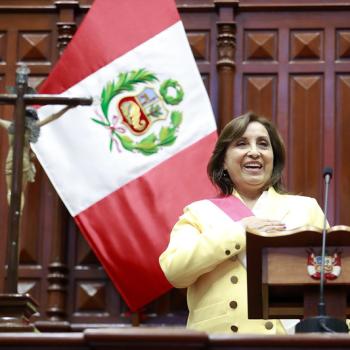My friend and fellow columnist-blogger, Tony Jones recently posted the following invitation to his readers.
I am writing this in advance of Tony's promised response, so I don't know how he will answer the question his friend, Rob, raises. Tony writes:
Here's an interesting "Question that Haunts Christianity" from loyal reader Rob:
Hey Tony. I will try to make this short . . . I was raised in the church, became a youth leader in my early 20s, then a worship pastor/elder, then a staff deacon at a large church. Almost three years ago, my family and I walked away, with no plans on returning to "the church." I don't intellectually assent to any of the things that orthodox Christians are supposed to (i.e. the Trinity, the physical resurrection of Jesus, etc.). I don't read my Bible very often. I never pray. But, I cannot escape the cultural influence that Christianity has had upon me, and it's very difficult for me to think outside of that framework. I also try to embody the trajectory of Jesus' life (the way of love) in my life every day. And, I think that his way is—universally—the best way to live. Do I still have "the right" to call myself a Christian? You answer here, I answer Friday. Let's hear if Rob's a Christian or not!
The invitation that Tony offers has more than a few hooks buried in it.
One could read it as an invitation to render judgment on Rob's soul and eternal destiny. One could read it as a question with social import and as one of inclusion. Or one could read it as an invitation to pronounce on the essence of what it means to be a Christian.
Practically speaking, of course, any answer to one of those three questions impinges on all three. The fact that Tony frames the question as one that "haunts Christianity" firmly underlines the peril in attempting an answer.
Asked in a slightly different form about who is saved and who is not saved, one bishop wisely responded, "I can't speak to that issue; I'm in sales, not management."
On the other hand, the way in which Tony raises the question is actually easy to answer, "Does Rob have 'the right' to call himself a Christian?"
Some of Tony's readers have pointed out that Rob has the right to say anything he wants to say and, in the categories that frame our freedom of speech, they are right. Rob does.
Rob can also rightly claim to have learned things from Christianity and/or to claim that his life has been shaped by Christian categories. He might even argue (as he seems to do) that the approach to living his life is best lived in response to Christian principles and teaching. (Although one could rightly ask whether the attempts to extract Christian "ethics" from their larger Christian theological underpinnings is at all the same thing.)
But from a theological point of view and by his own lights, Rob is not a Christian and, frankly, it shouldn't haunt Christians at all to say so. This doesn't mean that Rob is not a good human being, that God doesn't love him, nor is it to pronounce on how, where, and when God might graciously and lovingly nurture him. But to label what Rob still believes about the life and teaching of Jesus as "Christian" is profoundly misleading.
Nothing that historically has defined the essentials of the Christian faith falls under the heading, "I think the guy had it right about the way we should live."
This is where, in our post-Christian, post-modern world, we are amazingly reticent to own what we believe and yet it ought to be the gift of a fundamental shift in the social architecture of our world. The church is not one and the same with our national identity. The church does not pronounce on what it is right or wrong for others to believe. The church cannot dictate religious choices.
In recent months I've had occasion to talk to my Anglican brothers and sisters north of the border. They observe that although American and Canadian societies are roughly on the same cultural and social trajectory, Canada is clearly "ahead" of the United States, in terms of the changing tenor of the religious culture, the place of the church, and their acceptance of the changes.
They have learned these truths about their changing role. They have grieved the losses and now they are on the other side of that journey, re-learning the world. If I can take the liberty of paraphrasing what I've heard, I would say that they've learned that in acknowledging the changing place of the church, they have also rediscovered the freedom to be the church.
All they can do is witness clearly to the way in which they understand God and what they believe makes for a relationship with God. Period. End of story. No guilt, no haunting. Just clarity.





